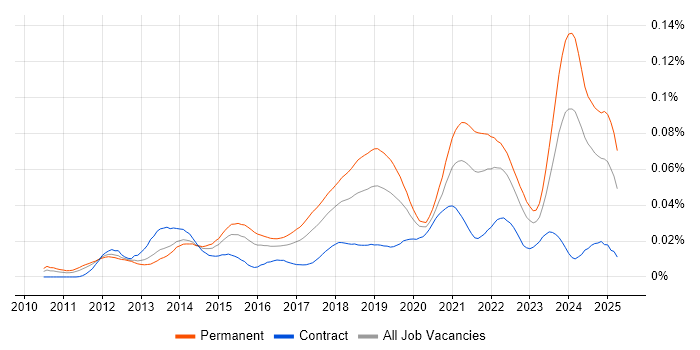Cloud Software Engineer
UK
The median Cloud Software Engineer salary in the UK is £90,000 per year, according to job vacancies posted during the 6 months leading to 2 May 2025.
The table below provides salary benchmarking and summary statistics, comparing them to the same period in the previous two years.
| 6 months to 2 May 2025 |
Same period 2024 | Same period 2023 | |
|---|---|---|---|
| Rank | 636 | 742 | 935 |
| Rank change year-on-year | +106 | +193 | +149 |
| Permanent jobs requiring a Cloud Software Engineer | 55 | 160 | 48 |
| As % of all permanent jobs advertised in the UK | 0.11% | 0.16% | 0.046% |
| As % of the Job Titles category | 0.12% | 0.17% | 0.050% |
| Number of salaries quoted | 54 | 38 | 19 |
| 10th Percentile | £62,000 | £50,000 | £55,050 |
| 25th Percentile | £78,795 | £61,180 | £60,000 |
| Median annual salary (50th Percentile) | £90,000 | £90,000 | £67,500 |
| Median % change year-on-year | - | +33.33% | -22.86% |
| 75th Percentile | £115,000 | £113,125 | £92,500 |
| 90th Percentile | - | £115,000 | £105,750 |
| UK excluding London median annual salary | £66,274 | £69,447 | £65,000 |
| % change year-on-year | -4.57% | +6.84% | -23.53% |
All Permanent IT Job Vacancies
UK
For comparison with the information above, the following table provides summary statistics for all permanent IT job vacancies. Most job vacancies include a discernible job title that can be normalized. As such, the figures in the second row provide an indication of the number of permanent jobs in our overall sample.
| Permanent vacancies in the UK with a recognized job title | 46,967 | 93,227 | 95,240 |
| % of permanent jobs with a recognized job title | 90.30% | 94.63% | 91.55% |
| Number of salaries quoted | 27,330 | 66,890 | 59,886 |
| 10th Percentile | £30,000 | £28,500 | £32,500 |
| 25th Percentile | £42,000 | £38,500 | £45,000 |
| Median annual salary (50th Percentile) | £57,500 | £52,900 | £60,000 |
| Median % change year-on-year | +8.70% | -11.83% | - |
| 75th Percentile | £75,000 | £71,250 | £81,250 |
| 90th Percentile | £97,500 | £90,000 | £100,000 |
| UK excluding London median annual salary | £52,000 | £50,000 | £52,500 |
| % change year-on-year | +4.00% | -4.76% | +5.00% |
Cloud Software Engineer
Job Vacancy Trend
Job postings that featured Cloud Software Engineer in the job title as a proportion of all IT jobs advertised.

Cloud Software Engineer
Salary Trend
3-month moving average salary quoted in jobs citing Cloud Software Engineer.
Cloud Software Engineer
Salary Histogram
Salary distribution for jobs citing Cloud Software Engineer over the 6 months to 2 May 2025.
Cloud Software Engineer
Top 9 Job Locations
The table below looks at the demand and provides a guide to the median salaries quoted in IT jobs citing Cloud Software Engineer within the UK over the 6 months to 2 May 2025. The 'Rank Change' column provides an indication of the change in demand within each location based on the same 6 month period last year.
| Location | Rank Change on Same Period Last Year |
Matching Permanent IT Job Ads |
Median Salary Past 6 Months |
Median Salary % Change on Same Period Last Year |
Live Jobs |
|---|---|---|---|---|---|
| England | +183 | 55 | £90,000 | - | 10 |
| London | +124 | 39 | £110,000 | +15.79% | 7 |
| UK excluding London | +94 | 14 | £66,274 | -4.57% | 3 |
| Work from Home | +174 | 13 | £66,274 | -4.57% | 6 |
| East of England | +56 | 6 | £66,274 | +26.24% | 2 |
| South East | +113 | 3 | £60,000 | - | 1 |
| North of England | +87 | 3 | £60,000 | -13.60% | |
| North West | +15 | 3 | £60,000 | -13.60% | |
| South West | - | 2 | £85,253 | - |
Cloud Software Engineer Skill Set
Top 30 Co-occurring Skills and Capabilities
For the 6 months to 2 May 2025, Cloud Software Engineer job roles required the following skills and capabilities in order of popularity. The figures indicate the absolute number co-occurrences and as a proportion of all permanent job ads featuring Cloud Software Engineer in the job title.
|
|
Cloud Software Engineer Skill Set
Co-occurring Skills and Capabilities by Category
The follow tables expand on the table above by listing co-occurrences grouped by category. The same employment type, locality and period is covered with up to 20 co-occurrences shown in each of the following categories:
|
|
||||||||||||||||||||||||||||||||||||||||||||||||||||||||||||||||||||||||||||||||||||||||||||||||||||||
|
|
||||||||||||||||||||||||||||||||||||||||||||||||||||||||||||||||||||||||||||||||||||||||||||||||||||||
|
|
||||||||||||||||||||||||||||||||||||||||||||||||||||||||||||||||||||||||||||||||||||||||||||||||||||||
|
|
||||||||||||||||||||||||||||||||||||||||||||||||||||||||||||||||||||||||||||||||||||||||||||||||||||||
|
|
||||||||||||||||||||||||||||||||||||||||||||||||||||||||||||||||||||||||||||||||||||||||||||||||||||||
|
|
||||||||||||||||||||||||||||||||||||||||||||||||||||||||||||||||||||||||||||||||||||||||||||||||||||||
|
|
||||||||||||||||||||||||||||||||||||||||||||||||||||||||||||||||||||||||||||||||||||||||||||||||||||||
|
|
||||||||||||||||||||||||||||||||||||||||||||||||||||||||||||||||||||||||||||||||||||||||||||||||||||||
|
|||||||||||||||||||||||||||||||||||||||||||||||||||||||||||||||||||||||||||||||||||||||||||||||||||||||
